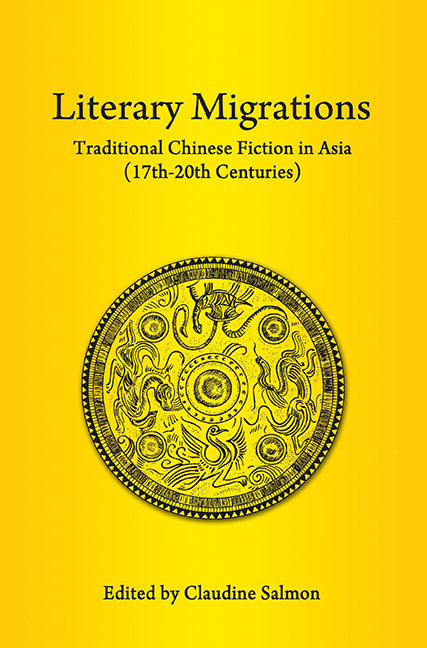Book contents
- Frontmatter
- Contents
- FOREWORD
- Dr Salmon as I Know her
- Preface to Reprint Edition
- Acknowledgements
- INTRODUCTION
- PART I KOREA AND JAPAN
- PART II MAINLAND NORTHEAST ASIA
- 4 The Manchu Translations of Chinese Novels and Short Stories — An Attempt at an Inventory
- 5 A Note about the Spread of Chinese Literature amongst the Mongols
- 6 Mongolian Translations of Old Chinese Novels and Stories — A Tentative Bibliographic Survey
- PART III MAINLAND SOUTHEAST ASIA
- PART IV INSULAR SOUTHEAST ASIA
- Bibliography
- Author, story-teller and translator index
- Title index
- List of Plates
- Contributors
- Plate section
4 - The Manchu Translations of Chinese Novels and Short Stories — An Attempt at an Inventory
from PART II - MAINLAND NORTHEAST ASIA
Published online by Cambridge University Press: 21 October 2015
- Frontmatter
- Contents
- FOREWORD
- Dr Salmon as I Know her
- Preface to Reprint Edition
- Acknowledgements
- INTRODUCTION
- PART I KOREA AND JAPAN
- PART II MAINLAND NORTHEAST ASIA
- 4 The Manchu Translations of Chinese Novels and Short Stories — An Attempt at an Inventory
- 5 A Note about the Spread of Chinese Literature amongst the Mongols
- 6 Mongolian Translations of Old Chinese Novels and Stories — A Tentative Bibliographic Survey
- PART III MAINLAND SOUTHEAST ASIA
- PART IV INSULAR SOUTHEAST ASIA
- Bibliography
- Author, story-teller and translator index
- Title index
- List of Plates
- Contributors
- Plate section
Summary
The acculturation process of the Manchu tribes to the more highly developed Chinese culture and tradition, taking centuries to complete, included in its different phases of development almost every aspect of spiritual, governmental and institutional life. Other than the learning gained directly from Chinese tutors, the other important vehicle for the transmission of Chinese culture was through the easily obtainable printed books. Chinese influence on the Manchus had begun long before the latter conquered Peking in 1644. It had come indirectly through the descendants of the Jurchen peoples, who ruled North China as the Jin dynasty from 1115 to 1234, and through the neighbouring Mongols. Even such Manchu cultural elements as shamanism, considered until today as purely autochthonous, were pervaded with ideas from Chinese Buddhism and Taoism to such an extent that one often wonders what exactly Manchu culture consisted of. Recent efforts to protect the national language and culture are further evidence both of Chinese culture's increasingly powerful force and of conscious attemps to mitigate it. It was the Manchus’ acute awareness of Chinese influences early on, however, as well as skill in handling the 2,000 year-old Chinese state, that enabled them to rule for 268 years despite their having been a meagre 2 per cent of the population.
The Manchus gave special attention to translations into Manchu of Chinese literature, along with their continued study of Chinese writings directly, with the aid of teachers. Further more, as Sinicization grew ever stronger and elements of native Manchu culture were considered inferior, Chinese literature gained ground. Even in the highest period of Manchu rule the native literature was never more than a vehicule of translation. Original Manchu works — apart from a few handwritten exceptions and a multitude of preserved official documents — did not survive the following suppressions and are today irretrievably lost. The majority was probably never set down in writing, but existed orally, as in case of the Mongolian tradition.
For the expert, the true value and skill of the Manchu translation literature derives from the factual interpretation of linguistically difficult Chinese texts by persons well versed in Chinese scholarship. As has often been pointed out, the Manchu translation of a Chinese original in some sense replaces the Chinese literatus who could translate and explain that particular text in the tradition of his time.
- Type
- Chapter
- Information
- Literary MigrationsTraditional Chinese Fiction in Asia (17th–20th Centuries), pp. 93 - 126Publisher: ISEAS–Yusof Ishak InstitutePrint publication year: 2013

